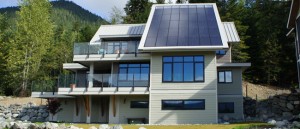I wrote a post on a the Sabin Coop Co-Housing Community in Portland. This featured 4 homes built on a single inner city lot. The homeowners shared a central courtyard, gardens, honey bees, yard duties as well as storage facilities and the list continues. The homes are positioned so the families can interact with each other and the members work together in a way few communities ever do. They even share a one room cob house that acts as an overnight guest house for community members friends and family.
On top of being the first couple to buy into the project, being instrumental in finding the other three homeowners for the original coop, David and Rosemarie are active community members. While we visited with them last fall David told us about another project he was working on called Solarize Portland.
The easiest way to describe the project is to show the transcript from our interview. This explains it in David’s own words.
David: So I just help to start and manage this project. It’s part of something called Solarize Portland. It’s a volume purchasing for solar panels. I did solarize northeast, so for the northeast part of town we put out a request for proposals for solar contractors and said, “We’re going to get you a high volume of installations, so you give us a price based on volume.” We selected a contractor to do all of the installations. We had actually over a thousand households originally registered for the project, and we ended up doing about 190 of solar installations in this part of town, totalling something like half a megawatt of installed capacity. That’s in less than a year.
So this is being done by quadrants in the different parts of the city now. In our project we tried to cut a template as we went along so that materials that we developed can be reused. Other neighborhoods are picking it up now. It’s huge because we’re going to have – I don’t know, in 2010 there will probably be 700 solar installations around the city, in 2008 there were 32. When we bought our system four years ago we paid $10 a watt. The price under our volume purchase plan was $5.95 a watt.
Terry: So the price per watt is coming down quite a bit.
David: Well, it’s come down a lot and through this community purchase plan we were able to really reduce the price, some of it is that the contractors can buy in volume, but a lot of it is that we’re doing the marketing for them. We’re going door to door and talking to people about it, holding solar workshops to educate people about it. We’re a community non-profit, we have no ax to grind. People are coming to us and we’re making it simple because we’ve selected a single contractor and a narrow list of products, and there’s a single price, you don’t have to figure stuff out, and we’re doing workshops to educate people.
Terry: Do you have a website for that maybe?
David: Yeah, SolarizePortland.org. That has links to the solarize northeast, solarize southeast, solarize southwest.
Terry: That’s something I wouldn’t mind trying in my community if you don’t mind us copying your idea.
David: Yes, other places can try that method.
In fact I’ve done a couple of presentations in other cities. Last spring before my mother moved here I was visiting her in Madison Wisconsin, and I did a presentation there for about 40 people about how to do this. They’re starting one.
Terry: That’s good, that’s a really good movement.
David: Seattle’s going to do one, New York is interested I understand. So the City of Portland has been helping to sponsor this. We met yesterday with somebody from the Federal Department of Energy who’s working with the city and they’re developing a manual of how to do community based solar projects.
Terry: It’s a wonderful thing to copy I think, very much so.
David: It’s pretty easy to do. We did it primarily with volunteers and almost virtually no budget.
The community solar projects become a Win-Win for all parties involved. The homeowners get a discount, the installers and manufacturers sell more panels and the city of Portland has to commit fewer resources to procuring power because the movement is much more than just one household.
Yes, a Win-Win for all.





A community solar project is a great idea.
Terry
So excited I found this arictle as it made things much quicker!